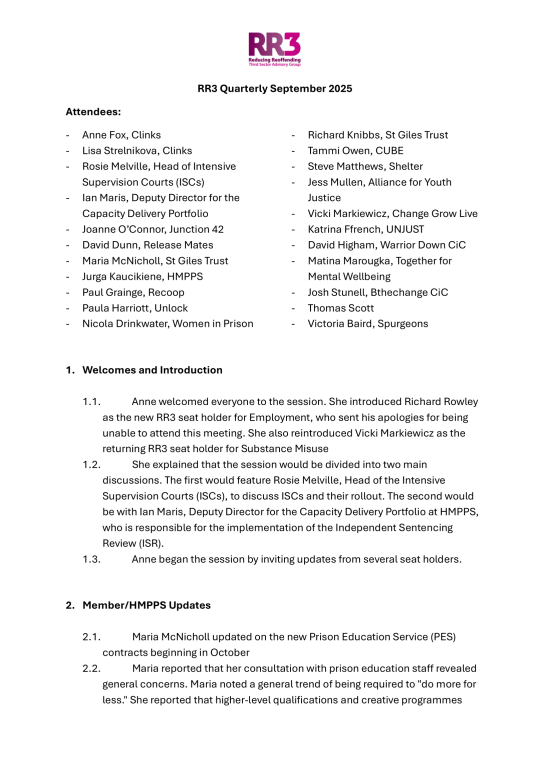A guest blog contribution from The Bell Foundation.
The Law Centres Network recently submitted Freedom of Information Requests to 49 police forces across the UK and analysed the responses to understand how each force addresses the needs of victims of crime who have limited or no English language skills in practice.
According to the 2021 Census, there are over one million people living in England and Wales who report not to speak English well or at all. Although there is a Code of Practice for Victims of Crime in England and Wales ('The Victims Code') stating that a victim has the right to be given information in a way that is easy to understand and to be provided with help to be understood – this research suggests this is rarely the case.
Pamela Fitzpatrick, Director of Harrow Law Centre, and Nimrod Ben-Cnaan, Head of Policy and Profile at Law Centres Network shared their insights about the research and its findings.
Q: Hi both, it’s great to have the chance to discuss this report with you. Can you tell us more about how the research come about?
Pamela: Harrow is an incredibly diverse borough – it's the most religiously diverse borough in London and around the fifth most racially diverse in the city, so there are people of all different religions and nationalities, including both newly-settled and older-settled residents.
Most of our clients at the Law Centre are looking for support with issues such as housing, welfare benefits, and immigration. Many speak English as a second language, with some having very good English for everyday things, some having no English at all, and others with varying levels in between. But when it comes to talking about legal matters, even people with very good English can find it confusing and may need support.
On top of this, an increasing number of our clients were telling us that they had been victims of hate crime and had reported it to the police but had not been treated fairly when doing so. We knew then that this was an issue we wanted to investigate further.
Nimrod: Yes, Harrow is also interesting in that the majority of its residents were not born in the UK and so that too informs their language needs. We realised that beyond the advice that is available from either Law Centres or other support organisations, there is a real crisis in how people can access legal assistance to get justice in the UK. There is probably more help that is not available than there is available.
We sent a Freedom of Information (FoI) Act request to all the police authorities in the UK to see if unmet language needs were a widespread issue or if it was just the experience of clients in Harrow.
Q: Can you talk a bit more about the impact of language support for victims who speak English as a second language and why it's important in helping them as they go through the criminal justice system?
Pamela: From our experience, even people with good English can feel quite intimidated if they're in a police station on their own because they’ve perhaps not experienced positive interactions with the police in the past.
For example, we supported a Lithuanian resident who had been evicted from her house of multiple occupancy and arrested because she had reportedly threatened another occupant with a knife. However, when we were able to speak to her directly, it turned out that she had been the victim of repeated sexual assault by the man in the room next to her. Although she had reported this to the police over a year before, no action had been taken. When the perpetrator came to her room again, she had protected herself with a knife. Once her full story was related to the police, all charges against her were dropped, and she was accommodated by the local authority.
These kinds of experiences can mean that while victims who speak English as a second language can understand what the police officers are saying to them when reporting a crime, they can’t really digest it. From our point of view, the main issue is ensuring that the police follow up on a reported crime in the first place, because they often trivialise the cases of victims who speak another language. At the Law Centre, our solicitors always ensure that we fully understand the client’s situation and that our client understands and agrees with the action we will take on their behalf.
However, our report found that the police will only hire an interpreter when the complainant speaks absolutely no English at all. For others, an officer who happens to speak a language might be asked to come and interpret for the individual, and for highly sensitive or distressing cases, they even ask children – other victims of crime – to come and interpret, which we found particularly disturbing. This evidence demonstrates that we have a big mountain to climb.
Q: What in the report findings struck you the most?
Nimrod: What struck me the most was the inconsistent approach in how police officers across the country have been trained, what they are prompted to ask when interviewing victims, and how that data is captured. In our research we found that the way in which the language needs of complainants or victims were assessed seemed to be left to the discretion of the police officer, often coming down to personal impressions – feeling much like a postcode lottery.
The lack of accountability for this issue also stuck out to me, as we had real difficulty in obtaining responses to our FOI request. Of nearly 50 forces that received our request, only seven forces replied in full. About a third declined initially and for some we had to submit refined requests to get meaningful responses.
Q: One of the recommendations of the report is to have all crime reports record data related to the language profile victims. Why is that so important?
Pamela: This recommendation is so important because it highlights how the system is currently failing many second English language speakers, in that almost none of them are getting the help they need.
Nimrod: Yes – recording the victim’s language profile in their case report has the potential to improve the way that the police interact with victims, since the obligation to ask this question would require them to consider their language needs. And of course, not every victim will need a full interpreter service. There are many other options in terms of language adaptations, such as allowing additional time orally to explain themselves, offering written communication specifically in non-English languages, or having easy read versions in pictorial format.
Q: What do you see as being the responsibility of individual police forces in addressing these issues versus those of the government?
Nimrod: Being able to address this issue calls for some standard setting and coordination. This could be led by the National Police Chief's Council (NPCC), which oversees policing progress and standards and sits between local police forces and the government. Obviously, there also needs to be some accountability on a local and national level, but a lot of this is driven by the understanding that what doesn't get measured doesn't get done. For this measurement to be of significance, it needs to be consistent across forces and across regions to allow us to compare and analyse how well things work. Hopefully, the routine recording and reporting on language needs would improve outcomes as well as accountability, reducing the need for FOI request projects such as ours.
Q: What else can we learn from the research?
Nimrod: Our analysis indicated that there is a gap between people's rights in law and what they actually enjoy in practice. At Law Centres, that is what we specialise in – using our skills to close that gap as much as we can. However, with the decimation of public and voluntary support services, what does remain tends to be specialist and specific. This is a plea for better integration – not just among services, but through better funding to help bridge that gap.
Pamela: That there is a need for funding to be available for victims to access legal advice. Currently this is out of scope of legal aid and few funders prioritise this work. As a result, those who have English as a second language are often excluded from access to justice.
What's new
Blogs
Homelessness Strategy Blog
Publications
Latest on X
The role is for a leader from an organisation focused on racially minoritised people, with expertise in service delivery, policy, advocacy, or related areas in criminal justice. Racial disparities are present at every CJS stage. This role ensures these voices are central in shaping policy to help address and eradicate them. Apply by Mon 18 Nov, 10am. More info: https://www.clinks.org/voluntary-community-sector/vacancies/15566 #CriminalJustice #RR3 #RacialEquity

